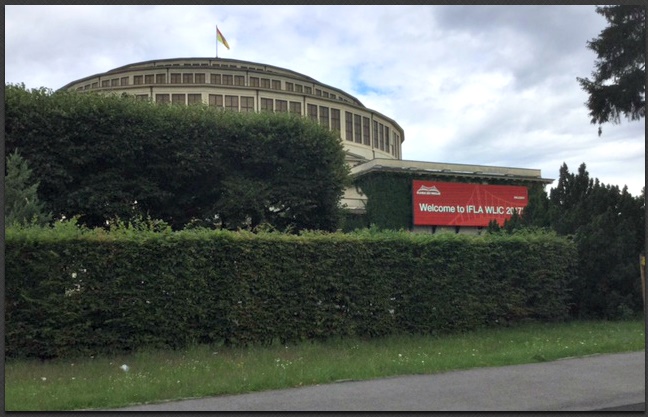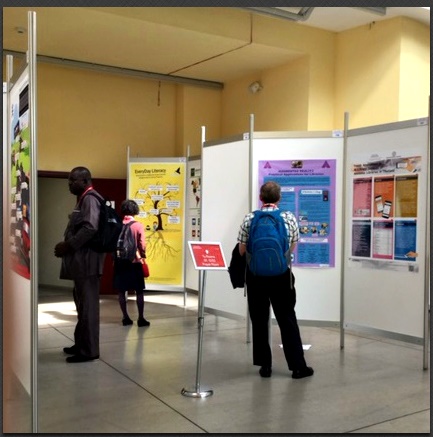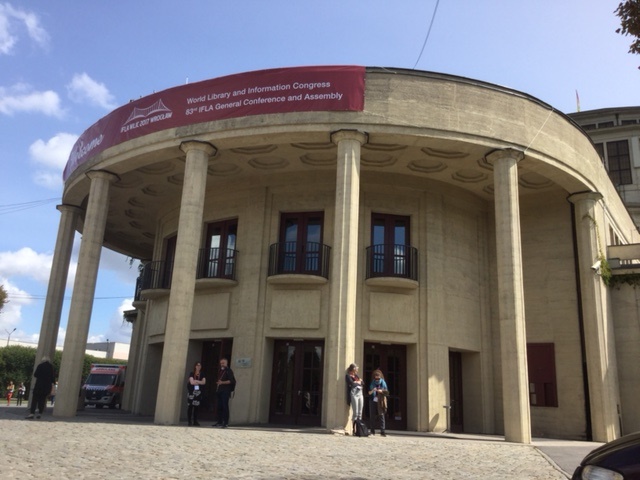By Maria Deptula
This past August I was fortunate to attend my first International Federation of Library Associations (IFLA) Conference, of which this year’s theme was:


When I arrived in Wroclaw on Sunday night, August 20th, I downloaded IFLA 2017 app and was quite disappointed that I missed the newcomers and US Caucus meetings that took place before my arrival.
On Monday I left my hotel in the Old Town early in the morning and took public transportation, which was provided for free by the City of Wroclaw to the conference attendees to Centennial Hall. After my credentials were checked, I entered the massive building and looked around to see where I should go first.
I studied the program booklet the night before, but the WLIC meeting schedule was rather complex. In addition to business meetings and awards of various committees and regional caucuses, attendees could choose between plenary sessions, tech lab sessions, offsite meetings, papers presentations, poster sessions and of course keynote and plenary speakers presentations.
Those who did not speak English could rent headsets for simultaneous interpretations. From the start, I was in awe to see people from all over the world, walking up and down the lobby, conversing in a multitude of languages and dressed in regional attires. This was one of the highlights of the conference, to see the many faces and cultures that comprise the library profession.
At first I wanted to focus only on those programs and ideas that I could apply to my own library needs, but quickly decided that the greatest benefit from this conference would be to simply listen to what people do in other countries, even if it’s not applicable to me or even U.S. libraries.
In various places inside Centennial Hall and around it, one could find red crates with “Leave a book- Take a book” Little Libraries, first introduced at the 2016 IFLA in Columbus, Ohio. The books left in the Little Libraries after the conference, were donated to various charities.

When I was asked by a colleague how I would describe the focus of this year’s WLIC, it took me a while to come up with a cohesive reply. If you would like to see the full program of the IFLA 2017 Congress, please check this website: https://2017.ifla.org/conference-programme. There were many topics, and themes discussed, and not one seemed to dominate. With attendees from all over the world, even a round-table discussion I joined felt like everyone was having a different perspective on the same problem. When the Anglo-Saxon/European group at my discussion table spoke about the need for librarians to reinvent the meaning of the profession, our colleagues from Africa and Asia talked about the demand for more libraries in their areas, while two librarians from Sweden invited all the librarians to their country, where there is a shortage of librarians. While the North America and Europe concentrate on advanced technologies and big projects sponsored by their governments such as digitization and sustainability in libraries, Asian librarians discussed their mobile catalogs, and the librarians from the former Soviet republics were thrilled that they could provide books in many local languages.
During the three days I attended the Conference, I listened to several plenary sessions, participated in one round-table discussion session, and learned about some new technologies, since luckily, the Expo Pavilion where the Tech Lab sessions took place, was located near the poster display area. I spoke to several co-presenters, and learned what new issues of interest to our colleagues in Japan, Korea, Malesia, Canada, Kirgizstan, and Finland.
I explored the topics such as how national libraries build a “memory bank” – web archives for the digital society and their many legal constraints, and on how libraries and librarians should communicate with people with autism or purposely use volunteers. Aware of how difficult it often is in U.S. to obtain funding for library programs, I was both astonished and disheartened to find out that the Dutch tax authorities pay the libraries to conduct tax literacy programs.
There were so many other events and activities, such as tours of numerous Polish libraries, off-site workshops or a cultural evening, which I was unable to attend. However, I consider the IFLA 2017 to be a successful professional development event not only because of the comments and questions about my poster, some of which I received even after the conference, but over a period of several days, I was able to participate in a library experience that encompassed not a state or country but the world. It was a kaleidoscope of people coming together to share ideas on how they are making their libraries better for their patrons.
2018 IFLA WLIC will take place in Kuala Lampur, Malaysia. Registration already opened. Click here for more information.
Maria Deptula is the Library Director at the Paramus Campus of Berkeley College. She can be reached at mde@berkeleycollege.edu
